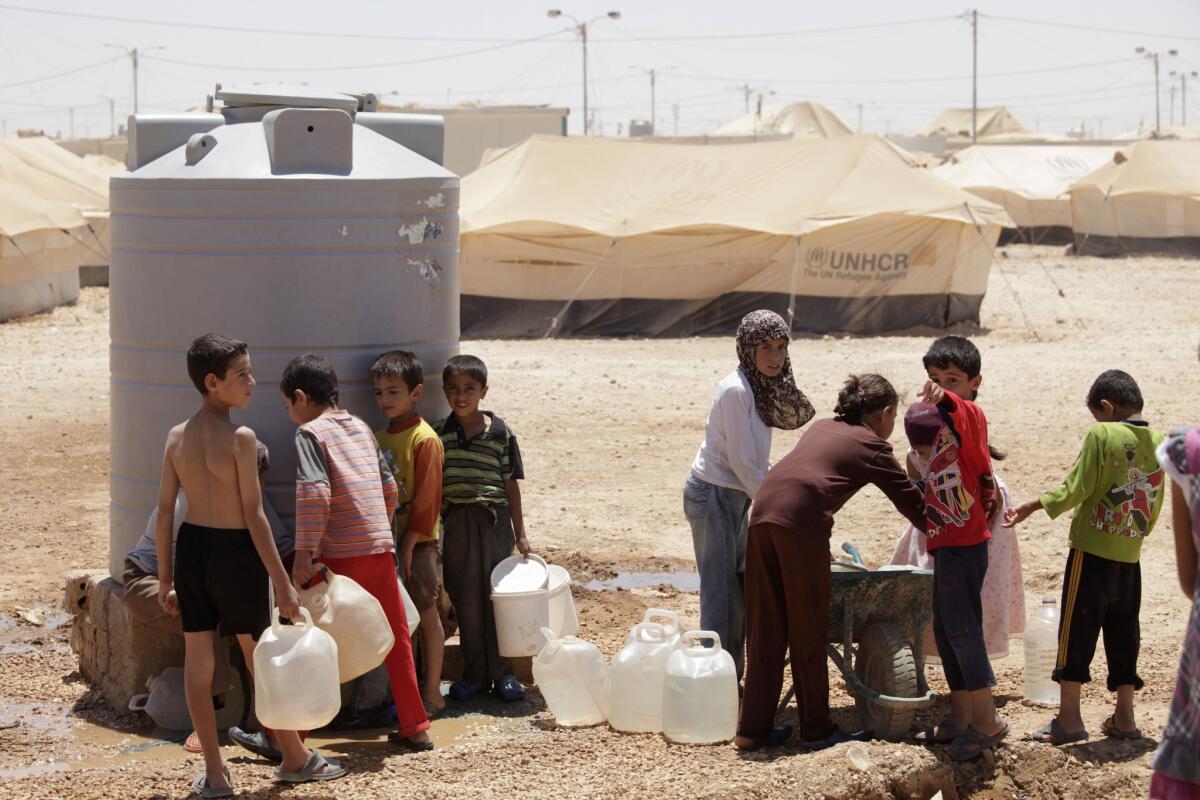No relief for Syria

- Share via
Some 6,000 refugees pour out of Syria every day, straining humanitarian aid resources and destabilizing the country’s neighbors. Cumulatively, they already make up 10% of the population of Jordan. And there is no end in sight.
Antonio Guterres, the U.N. high commissioner for refugees, says the displacement of people has not risen “at such a frightening rate” since the Rwandan genocide of 1994. The absolute size of the humanitarian catastrophe may not yet match the largest of recent times, such as the 2010 floods in Pakistan, but Syria is working hard to catch up.
Moreover, its political effects are potentially far greater than those of any tsunami or earthquake. Syria’s civil and proxy war has set the old Sunni-Shiite wound bleeding again. Iran, Hezbollah and Iraqi Shiite Muslims support the forces of Syrian President Bashar Assad against internal and external Sunni Muslim foes. Besides Islamic patron states, including Saudi Arabia and Turkey on the Sunni side, there is Russia arming Assad’s forces against rebels who are being (very tentatively) supported by the U.S. — almost as if we were back in the Cold War.
Syria also fits into a larger picture, with the United Nations recording an 18-year high of more than 45 million forcibly displaced people worldwide at the end of 2012. The current rate of displacement is about one person every four seconds.
“Something must be done!” we cry, as we pack our suitcases for summer holidays. But what? Make the decisive, massive military intervention that alone would defeat Assad, and you face another Iraq. Don’t intervene and accept another Bosnia. The record of Western military intervention in this region is disastrous. Yet the notion that not intervening in any way is always the most moral option simply does not stand honest scrutiny.
Syria demands that we think again about the relationship between politics and humanitarian action. This month, a former British foreign secretary, David Miliband, reflected on this in a speech before leaving his first life, as a politician, to begin his second life, as the leader of the International Rescue Committee.
The morality of what he will do as a humanitarian is far simpler than what he did, or might still be doing, as a politician. Deploying tents to shelter people in desperate need is more obviously good than deploying half-truths to win votes. But it could also be a far less effective thing than what his brother, Labor Party leader Ed Miliband, may yet have a chance to do as Britain’s prime minister.
For the nature of humanitarian relief in man-made disasters is that you are treating the symptoms and not the causes. Were politicians effectively to address the political causes of Syria’s disaster, that would be more valuable than everything that all the humanitarian organizations can do. If the United States, Europe and Russia got together and said, “We’re going to de-escalate this conflict, through stopping all the arms supplies we have any influence on, followed by a negotiation involving all the relevant internal parties and external powers, including Iran,” they might get somewhere. But it’s simply not happening, nor is it likely to.
Pressed for a no-fly zone by angry Syrian refugees in the Zaatari refugee camp, a tent settlement so densely populated it is said to be Jordan’s fourth-largest city, Secretary of State John F. Kerry explained to them that “a lot of different options are under consideration.” Translation: Washington sees no good ones.
That’s no excuse for abandoning the politics. But given that they are blocked, humanitarian relief becomes even more vital. Until the surgeons finally tackle the causes of the disease, we have to keep changing the bandages, alleviating the pain and feeding the patient. But this too is not happening enough. Governments have met only one-third of the U.N.’s funding targets for humanitarian assistance for Syria. That puts even more strain on nongovernmental humanitarian organizations, yet Oxfam says people have so far donated just one-third of its $45-million target for Syria. The Disasters Emergency Committee, a seasoned coalition of charities, has raised only $26 million. By contrast, its campaign for victims of the Asian tsunami raised $600 million.
It seems that visually shocking natural disasters, where people are seen to be innocent victims of what insurers call “acts of God,” get us giving far more generously than do political conflicts. This is perhaps understandable, but it’s not rational. Why should what innocent people suffer as a result of “acts of God” be considered worse than what innocent people suffer as a result of their compatriots fighting one another in the name of God?
As a columnist on international affairs, I get tired of telling governments they “must” do something, knowing that nine times out of 10, they won’t. This time I have a simpler conclusion: Before we go on holiday, we should all make a donation to humanitarian relief for Syria.
Timothy Garton Ash is professor of European studies at Oxford University, a fellow at the Hoover Institution at Stanford University and a contributing writer to Opinion. His latest book is “Facts Are Subversive: Political Writing From a Decade Without a Name.”
More to Read
A cure for the common opinion
Get thought-provoking perspectives with our weekly newsletter.
You may occasionally receive promotional content from the Los Angeles Times.






